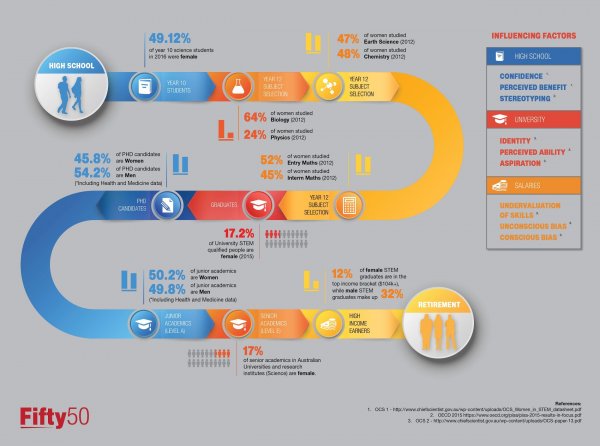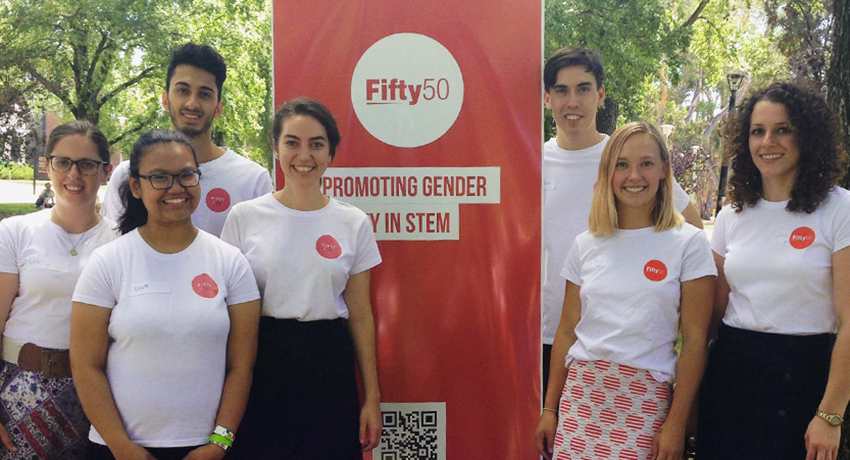It’s 2017, and yet we are still reading so many articles titled “Why so few?” – why are there so few women in STEM? It is an easy question to answer: as a society, we have not worked hard enough to combat gender stereotypes, improve STEM education, or remove the unconscious bias that exists in so many systems, processes, and people. With economic equality, and thus true equality, predicted for the year 2186, something has got to change – and it needs to change now. If it doesn’t, generation after generation will continue to regard gender inequity in STEM as the status quo. We have news for you: this status quo is more dangerous than it would be to enact meaningful change.
You might have joined the ‘Women in Science/Engineering’ group at university. You might be part of one today. Your university or company, of course, has a Diversity and Inclusion (D&I) strategy. You could be a mentor of young women. You even call yourself a feminist!
But have a look around – is there gender balance in your grad program? How about middle management? Executive positions? Dare we even ask what your company board looks like? If you are a university lecturer – do you describe the women you have in engineering/computer science/maths/physics as “few, but brilliant”? And of the women who are there – are they thriving? If you can identify gender balance at every single stage of the STEM pipeline to which you have been exposed, unfortunately, you are the exception, and not the rule (see below).

Image credit: Liz Cowling 2017
Not only is achieving true gender equity just the right thing to do, it makes economic and political sense. But it is also the only hope we have to overcome the wicked problems that face society: climate change, refugee crisis, cyber threats, and ageing populations. Can we expect to solve these problems, to the best of our abilities, when we don’t have the diversity required to produce the quality solutions we need? Flatly – no.
We know that we need gender equity in STEM – but why are we not there yet? Rampant tokenism (“I support gender equity” or mentoring programs for the sake of mentoring programs), unconscious bias, duplication and dilution of efforts and finances (how many unevaluated outreach programs have you come across?), and a lack of evidence-based programs result in the failure to attract and retain women in STEM.
If 2186 is too long to wait for gender equity, what is a suitable target?
If 2186 is too long to wait for gender equity, what is a suitable target? To urge us to take action, it will have to be uncomfortably close. At ANUFifty50, we think 2025 is this target. This places the responsibility on every part of the STEM pipeline to achieve and maintain equity within their own sector, and collaborate with others. It will force us all to think creatively, and importantly, it is an uncomfortably close target – because we all know change doesn’t happen in our comfort zones.
Gender Equity in STEM by 2025 is the goal proposed to participants of Fifty50’s Big Ideas Breakfast, held on the 10th August. Breakfast participants come from every sector – from university academics, to Partners of large corporations, to local and Federal government. They will be tasked with creating action plans detailing how they will help us to reach #Fifty50by2025.

ANUFifty50 co-founders Emily Campbell and Francesca Maclean, along with Emily Rose Rees (Support & awareness) and Katie Ward (Mentoring co-ordinator) attend the 2016 Connecting Women in STEM National Symposium.
How are they going to achieve this goal? They will be working within three key themes that are essential for gender equity – empowerment, advancement, and inclusion. The empowerment of women to provide them with the confidence to thrive in their studies or career, in a way that enables them to make choices free from stereotypes, expectations or biases.
The advancement of women in STEM environments requires the removal of systemic barriers that currently inhibits retention and upwards movement. And finally, the inclusion of women, so that when they are in classrooms, offices, or boardrooms, everyone feels like they belong and that they are respected and appreciated for their differences.
These ideas aren’t new, but the way we work towards them needs to be. We need to do more evaluation of programs and their efficacy. We need to start rethinking our systems with a blank slate, and consider how the structures in place dictate how we operate – and how we can make them inclusive of everyone. And we need to make collaboration between groups more cohesive and more meaningful.
Our Big Ideas Breakfast participants will reject the status quo and will fiercely work to remove the barriers to diverse, inclusive, and equitable STEM environments. They will do so because they know that by doing nothing we are not realising the potential of our community, or even understanding what STEM would look like without these social barriers. What will you do?




